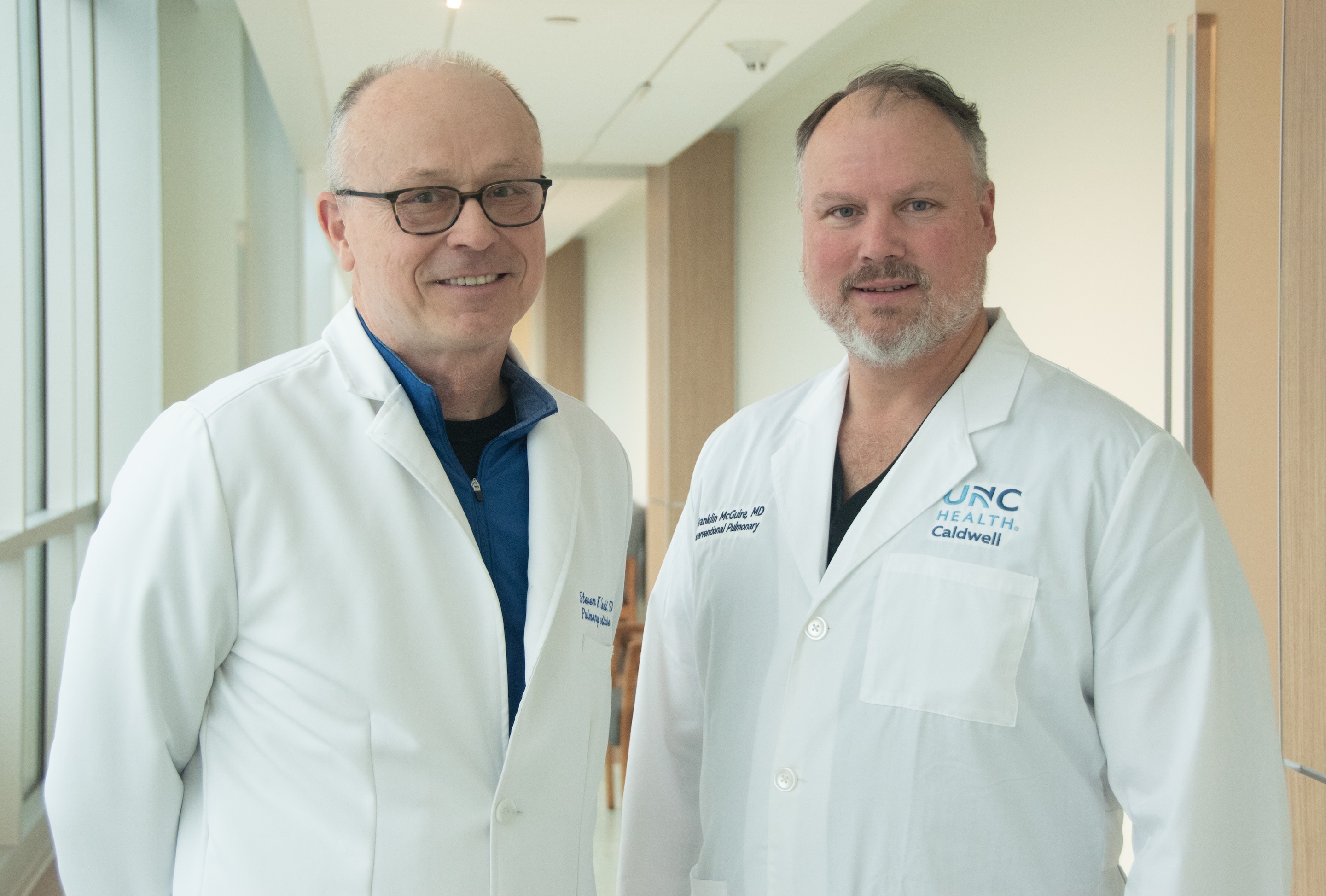Respiratory & Pulmonary Care

Pulmonary Care
At UNC Health Caldwell, pulmonary care spans a wide range of conditions. No matter your diagnosis, you can expect the highest level of care. Partner with a board-certified pulmonologist at UNC Pulmonology for breathing and lung care. Receive treatment to feel better and live your best life possible.
What’s a Pulmonologist?
A pulmonologist is a doctor who provides specialized care for conditions that affect your lungs or breathing ability. Healthy lungs supply oxygen to your body.
Integrated Care
UNC Pulmonology combines expertise in a variety of pulmonary disease processes. We collaborate with all members of your care team including social work, neurology, nutrition and psychology, primary care, cardiology, medical and radiation oncology, physical therapy and more to provide you with care for your overall well-being. In addition to providing high-quality care for general pulmonary disorders, we also specialize in interventional pulmonology.
Interventional pulmonology is a new field within pulmonary medicine that focuses on the use of advanced diagnostic and therapeutic techniques for patients with lung cancer, airway disorders and pleural diseases.
Diseases Evaluated and Treated
Find prevention, diagnosis and treatment for lung diseases, airway disorders and respiratory conditions, such as:
- Acute Respiratory Distress Syndrome (ARDS)
- Asthma
- Central Airway Obstruction
- Malignant/Cancerous
- Non-Malignant/Non-Cancerous
- Sarcoidosis
- ANCA Associated Vasculitides
- Post-Intubation Tracheal Stenosis
- Subglottic Stenosis
- Foreign Bodies
- Tracheobronchomalacia
- Relapsing Polychondritis
- Respiratory Papillomatosis
- Pulmonary Alveoloar Proteinosis
- Post-Infectious Stenosis
- Chronic obstructive pulmonary disease (COPD)
- Chronic bronchitis
- Emphysema
- Cystic fibrosis
- Interstitial Lung Disease
- Lung Cancer
- Lung Nodules and Masses
- Pleural Disease
- Pleural Effusions
- Transudative
- Heart Failure
- Hepatic Hydrothorax/Cirrhosis
- Renal Failure
- Exudative
- Malignant
- Mesothelioma
- Infectious/Empyema
- Tuberculous
- Connective Tissue Disorders
- Others
- Pneumothorax
- Traumatic
- Broncho-Pleural Fistula
- Alveolar-Pleural Fistula
- Primary
- Secondary to Lung Disease
- Pneumonia
- Respiratory Failure
- Respiratory Illnesses
- Sleep Disorders
Interventional Pulmonology Services Provided
Therapeutic Bronchoscopy
We provide relief of dyspnea (difficulty breathing) from cancerous and non-cancerous causes using rigid and flexible bronchoscopy techniques and state of the art equipment including:
- Ablation Techniques
- Argon Plasma Coagulation (APC)
- Mechanical Debulking
- Electrocautery
- Cryotherapy
- Endobronchial Brachytherapy
- Stenting
- Balloon Bronchoplasty
- Percutaneous Tracheostomy
- Bronchoscopic Lung Volume Reduction (BLVR) - Valves for COPD Treatment
Advanced Diagnostic Bronchoscopy
We diagnose, stage and provide samples for therapeutic and prognostic testing and place fiducial markers for Stereotactic Body Radiation Therapy (SBRT/Cyberknife) all within the same procedure and anesthesia session. We accomplish this with the most modern and state of the art equipment.
- Linear and Radial Endobronchial Ultrasound (EBUS)
- Autofluorescence and Narrow-Band Imaging
- Robotic Bronchoscopy
Pleural Disease Treatment
We provide consultation and treatment of benign and malignant pleural disease such as mesothelioma, metastatic cancer, connective tissue diseases, bronchopleural fistula/persistent air leak and both acute and chronic infection in concert with other disciplines. We perform all pleural procedures under image guidance (ultrasound or CT) including:
- Ultrasound-Guided Thoracentesis
- Ultrasound-Guided Pleural and Lymph Node Biopsy
- Ultrasound-Guided Small Bore Chest Tube/Pigtail Catheter Placement
- Pleural Manometry
- Tunneled Pleural Catheter (PleurRX®) Placement
- Chemical Pleurodesis/Pleural Sealing
- Medical Thoracoscopy
Additional Lung Services, Tests and Treatments
Rely on your UNC Pulmonology pulmonologist for a complete lung and breathing consultation. Your doctor may recommend:
-
-
- Bronchoscopy - Check or treats the airway passages leading to your lungs
- Lung Biopsy - Removes a small amount of tissue for testing
- Lung Function Tests - Check how well your lungs work
- Aridol breathing challenge
- Spirometry
- Oximetry - Measures the amount of oxygen in your blood
- Pneumonia and influenza vaccinations
- Thoracentesis - Removes fluid from the space between your lungs and the chest wall
Low-Dose CT Lung Scan
Talk to your doctor about whether lung cancer screening is right for you. A low-dose CT (computed tomography) scan can detect lung cancer before you have symptoms. You may be eligible for a lung cancer screening if:
- You are 55 to 80 years old
- You have a history of smoking at least 30 packs per year
- You smoke now, or you quit within the last 15 years
- You are in good health
Respiratory Care and Therapy
Get care from respiratory therapists (RTs) at UNC Pulmonology to help you breather easier. Your respiratory therapist will work with your doctor to monitor your breathing and provide treatments such as:
- Bronchodilator Therapy - Relaxes the muscles in your airways to make it easier to breathe
- Chest Physiotherapy (CPT) - Loosens and helps remove excess mucus from your lungs to improve breathing
- Incentive Spirometry - Exercises your lungs by helping you practice taking deep breaths
- Mechanical Ventilation - Uses a machine to help you breathe
- Oxygen Therapy - Increases the amount of oxygen in your lungs and blood
- Pulse Oximetry - Measures the oxygen levels in your blood
- Pulmonary Function Testing - Assesses how well your lungs work
Help to Quit Using Tobacco
Turn to UNC Pulmonology for help when you're ready to stop using tobacco. Talk to your pulmonologist or primary care provider about the steps to quitting.
Take advantage of local classes and support at our Quest4Life Wellness center. Call 828-758-8753 to learn more about how we can help you.
24/7 North Carolina Help
Visit QuitlineNC or call 1-800-QUIT-NOW (1-800-784-8669) to talk to a quit coach.
Online Resources
Access these websites for information to help you quit using tobacco products: